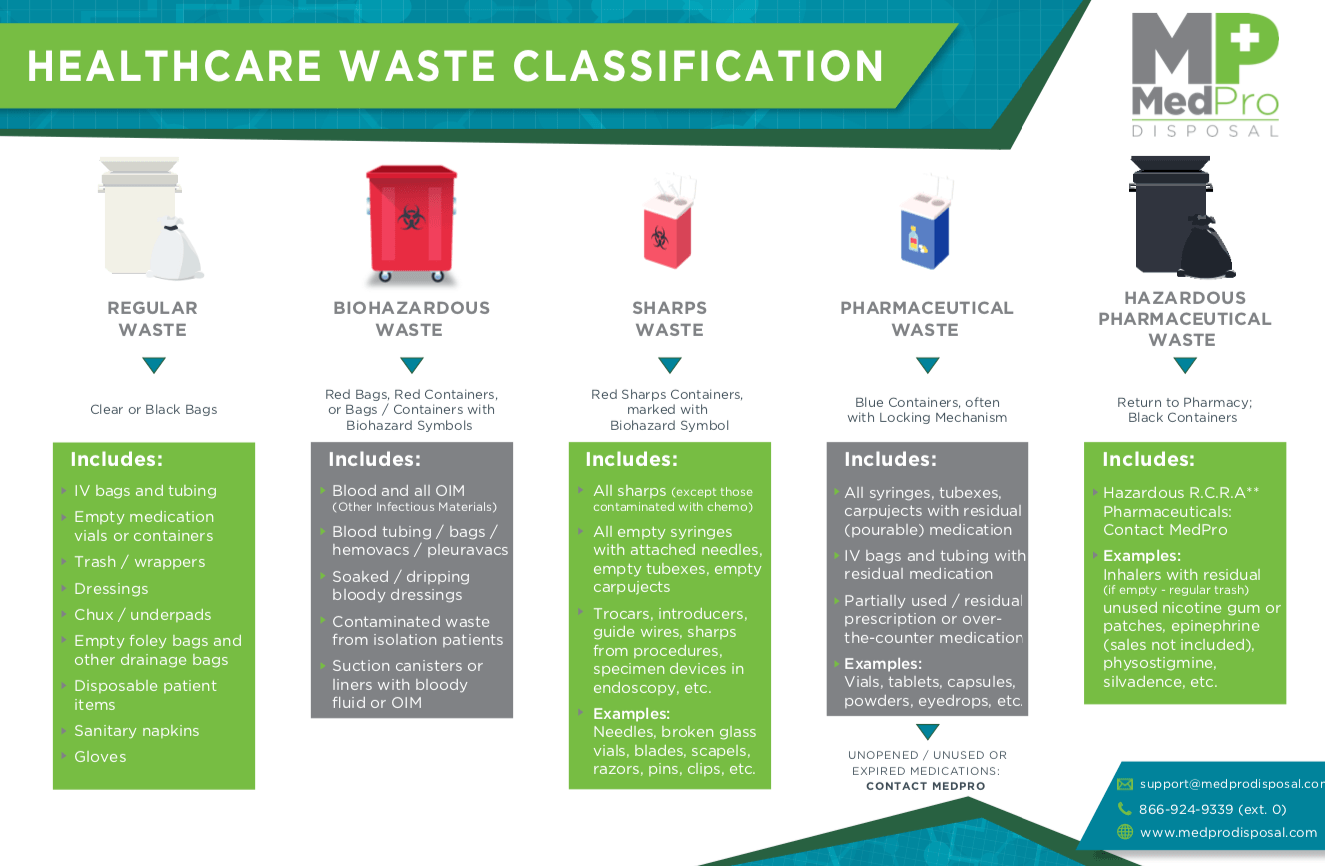Experience Unleashed: Grasping the Art of Medical Waste Removal for Wellness Facilities
Experience Unleashed: Grasping the Art of Medical Waste Removal for Wellness Facilities
Blog Article
The Importance of Proper Waste Disposal Practices
From the effects of incorrect waste disposal on our environment to the lasting ramifications for future generations, the importance of embracing sustainable waste management techniques can not be overstated. By exploring the ecological effect of untrustworthy waste disposal, the benefits of recycling initiatives, and the relevance of community involvement in waste decrease initiatives, a much deeper understanding of why correct waste disposal techniques are crucial arises.
Environmental Impact of Improper Disposal
Improper disposal of waste positions a considerable threat to the setting because of its harmful impacts on communities and human wellness. When waste is not effectively managed, it can cause pollution of the water, dirt, and air, triggering harm to numerous plant and pet species. click here. Chemicals and toxins from poorly disposed waste can seep into the ground, infecting groundwater sources and impacting the health and wellness of both wildlife and humans
In addition, the buildup of waste in garbage dumps creates greenhouse gases like methane, contributing to environment adjustment and global warming. Incorrect disposal methods also lead to littering, which not just deteriorates the aesthetic value of the environment but can additionally hurt wild animals through ingestion or complexity.
To reduce these ecological effects, it is vital for individuals and communities to adopt appropriate waste disposal methods such as reusing, composting, and liable harmful waste disposal. By taking these steps, we can help protect ecological communities, protect natural sources, and guard human health for future and existing generations.
Advantages of Recycling Programs
Routinely joining recycling programs provides various benefits for both the environment and culture all at once. One of the essential benefits of recycling is the conservation of natural deposits. By recycling materials such as paper, metal, plastic, and glass, much less resources require to be removed from the planet, causing decreased logging, mining, and drilling activities. This conservation of resources not only assists in keeping eco-friendly equilibrium but likewise adds to lasting development.
Moreover, recycling plays a vital duty in reducing energy usage and greenhouse gas exhausts. The production of products from recycled materials typically calls for less power compared to making from virgin resources - medical waste removal. Consequently, the carbon impact connected with the production procedure is significantly decreased, assisting in the battle against environment adjustment
In addition, recycling programs develop work chances in the reusing market, promoting financial growth and social well-being. By motivating the recycling and reuse of products, these programs support a round economy that lessens waste generation and optimizes resource effectiveness, inevitably causing a cleaner, greener future for generations to come.
Hazardous Waste Monitoring Standards
Executing reliable hazardous waste administration guidelines is critical for decreasing environmental and health dangers linked with the improper disposal of harmful products - click here. Proper handling, therapy, and disposal of unsafe waste are vital to protect against contamination of dirt, water resources, and air
One trick guideline is proper labeling of contaminated materials containers to ensure safe handling and transport. Furthermore, facilities must abide by strict storage requirements to stop leaks, spills, or accidents that can threaten human wellness and the environment. Routine training programs for employees on unsafe waste management methods are additionally essential to ensure compliance with guidelines and promote a culture of safety and security.
Moreover, contaminated materials must be set apart based on its buildings to avoid chemical responses that can bring about hazardous scenarios. Implementing a thorough waste tracking system can help monitor the movement of dangerous products from generation to disposal, ensuring openness and responsibility. By following these standards carefully, industries and services can add to a safer and cleaner environment for future and present generations.
Community Involvement in Waste Reduction
To efficiently address the ecological and wellness dangers connected with hazardous waste management, engaging the neighborhood in waste reduction efforts is vital. Area involvement plays a critical role in advertising sustainable waste monitoring methods and fostering a society of environmental responsibility. By educating residents about appropriate waste segregation, reusing, and composting strategies, areas can substantially lower the amount of waste sent out to landfills, therefore decreasing environmental contamination and preserving natural sources.
Area engagement in waste reduction programs additionally helps in elevating recognition about the relevance of waste minimization and encourages individuals to take on eco-friendly practices in their day-to-days live - medical waste removal service. Collective efforts in between local authorities, waste administration companies, and community members can bring about the implementation of effective waste decrease strategies customized to the certain needs of each neighborhood or community
Furthermore, community engagement cultivates a sense of ownership and liability amongst residents, empowering them to take proactive steps in the direction of lowering waste generation and promoting a cleaner, healthier atmosphere for future and present generations. By collaborating in the direction of typical waste reduction goals, areas can make a considerable effect on minimizing the unfavorable results of inappropriate garbage disposal methods.

Future of Sustainable Waste Practices
Standard waste disposal methods, such as landfilling and incineration, are no longer lasting in the long term due to their significant environmental effects. Moving ahead, the future of sustainable waste techniques lies in accepting a circular economic situation approach, where sources are recycled, reused, or repurposed to decrease waste generation.
Technical developments play straight from the source a key role in shaping the future of sustainable waste methods. Advanced waste sorting and reusing innovations can aid boost the efficiency of waste management procedures, permitting for the recovery of beneficial resources from waste streams. Furthermore, the fostering of biodegradable materials and composting techniques can assist reduce the amount of organic waste finishing up in land fills, consequently minimizing greenhouse gas emissions.
In addition, promoting consumer recognition and education on correct waste partition and disposal techniques is vital for driving behavior adjustment towards sustainability. By cultivating a culture of waste decrease, recycling, and reuse, neighborhoods can collectively add to a cleaner and healthier setting for future generations.

Conclusion
In conclusion, correct waste disposal methods are vital for reducing environmental impact and promoting sustainability. By implementing reusing programs, taking care of contaminated materials appropriately, and motivating area involvement in waste reduction initiatives, we can function towards a cleaner and much healthier environment. It is vital for individuals, businesses, and governments to prioritize sustainable waste practices for the future well-being of our world.

From the repercussions of incorrect waste disposal on our setting to the long-lasting effects for future generations, the significance of taking on sustainable waste management techniques can not be overemphasized. By checking out the environmental impact of careless waste disposal, the advantages of reusing initiatives, and the value of area engagement in waste reduction initiatives, a deeper understanding of why appropriate waste disposal practices are important arises.
By informing locals regarding appropriate waste partition, reusing, and composting techniques, neighborhoods can significantly lower the amount of waste sent out to land fills, thereby reducing ecological air pollution and preserving all-natural resources. (click here)
Moving ahead, the future of sustainable waste methods lies in welcoming a round economic climate strategy, where sources are reused, recycled, or repurposed to minimize waste generation.
Advanced waste sorting and reusing technologies can assist improve the effectiveness of waste monitoring procedures, permitting for the recovery of valuable sources from waste streams.
Report this page